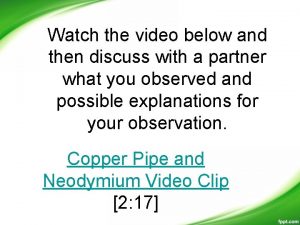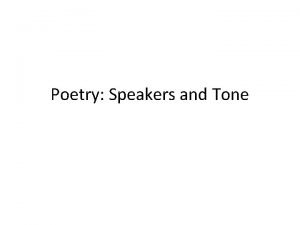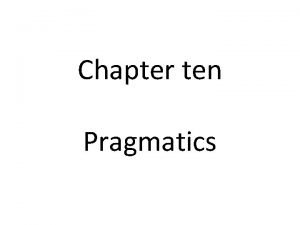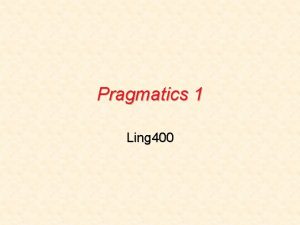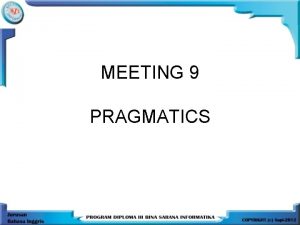Week Four Pragmatics The study of what speakers




- Slides: 4

Week Four: Pragmatics The study of what speakers mean, or 'speaker meaning', is called Pragmatics

Context We have got two kinds of contexts. 1 - one kind is best described as linguistic context, also known as cotext. The co-text of a word is the set of other words used in the same phrase or sentence. e. g. I get to the bank to cash a cheque. Bank is homonym. By looking at other words in the sentence we know which type of bank is intended. 2 - another type of context is described as pysical context. Our understanding of what we read and hear is tied to the physical context, particularly the time and place. e. g. The word bank on the wall of a building in a city.

Dexis There are some words in the language that can not be interpreted at all unless the physical context is known. “ here, this, that, now, then, yesterday, come “ , pronouns, such as “ I , you, him, her, them “. e. g. You will have to bring that back tomorrow, because they are not here now. – this sentence is vague. You, that, tomorrow, they, here , now => these expressions are called deictic. Person deixis : expressions used to point to a person. Place deixis : words used to point to a location. Time deixis : expressions used to point to a time. There is a distinction between what is marked as close to the speaker ( this, that, now ). What is marked as distant ( that, there, then ).

Presupposition Speakers design their linguistic messages on the basis of assumptions about what their hearers already know. What a speaker assumes is true or known by the hearer can be described as presupposition. e. g. Your brother is waiting for you. – There is a presupposition that you have a brother. “ Constancy under negation “ test is applied for presupposition. My car is wreck. / my car is not wreck. => “ I have a car “ remains true in both

